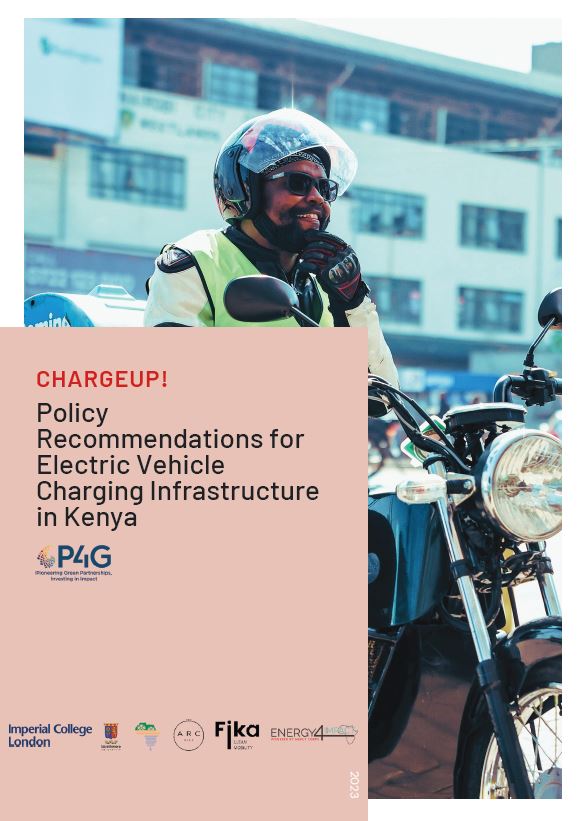Charge Up! makes policy recommendations to accelerate the transition to e-mobility in Kenya
Charge Up! – a collaborative e-mobility project underway in Kenya with Energy 4 Impact on board as one of the partners – recently published a policy brief which sets out recommendations for bolstering the charging infrastructure for electric vehicles. The brief identifies the critical fiscal and non-fiscal incentives required in the short- to medium-term to foster the mass adoption of electric vehicles across the country.
Whilst its position as a major African transport hub is a driver for Kenya’s economic growth, the dominance of internal combustion engines powered by fossil fuels on the roads comprises a major source of greenhouse gas emissions. In 2019, road transport contributed 12.3MtCO2e in emissions, representing a more than 50% increase since 2010. To address the urgent need to curb vehicle emissions that contribute to localised pollution as well as climate change, the Kenyan government has developed strategies and policies that facilitate the transition to safer and more sustainable forms of domestic transport.
Key measures put in place to drive the uptake of electric vehicles include a target of 5% of Kenya's vehicle stock electrified by 2025, whilst the owners of commercial buildings must ensure that at least 5% of parking spaces provided in their facilities are dedicated to charging electric vehicles. Despite efforts to create a supportive environment to accelerate the transition, the electric vehicle sector continues to face multiple challenges, particularly around an unfavourable tax structure which disincentivises manufacturers and importers.
Against this backdrop Energy 4 Impact, Arc Ride, Fika Mobility, Imperial College London and Strathmore University launched Charge Up! in February 2022, a collaborative pilot aimed at closing key operational and technological gaps within the sector. Funded by P4G Partnerships, Charge Up! has been testing the commercial viability of a battery-as-a-service model by establishing a network of battery swapping and charging stations in Nairobi. It has also been attempting to quantifying the environmental benefits by measuring reductions in localised pollution and carbon emissions.
Based upon insights gained over the last 12 months, Charge Up! has now published a set of policy recommendations around the charging infrastructure needed to hasten the mass adoption of electric vehicles nationwide. The recommendations focus upon both fiscal and non-fiscal incentives such as:
- Adopting an industrial tariff for designated charging and battery swapping stations.
- Waiving import duties and VAT on new electric vehicles, EV batteries, charging and battery swapping equipment
- Establishing Low Emission Zones as well as providing for EV charging stations in city planning rules and building codes.
- Promoting the interoperability of e-mobility infrastructure and services.
Click here to download the policy brief.

